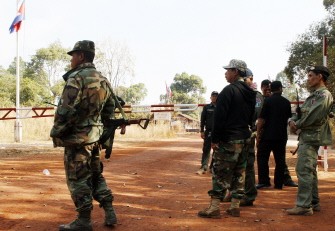A Thai soldier was killed in clashes with Cambodian troops at the two countries' border early Saturday, bringing the toll to three in the deadliest fighting between the neighbours in almost two years.

Renewed gunfights broke out briefly early in the morning near a disputed 11th-century temple, officials on both sides said, just hours after skirmishes left a Cambodian soldier and a Thai civilian dead.
Cambodia's Foreign Minister Hor Namhong wrote to the United Nations to draw its attention to the "explosive situation at the border".
Blaming the fighting on "flagrant aggression" by Thai troops, he said "Cambodian troops had no option but to retaliate in self-defence", in a letter addressed to UN Security Council president Maria Luiza Ribeiro Viotti.
He did not explicitly call for UN intervention.
Thailand, which was to convene an urgent security meeting on Saturday afternoon to assess the situation, said it was also considering filing a complaint to the UN.
Clashes between the neighbours erupted for the first time in more than a year on Friday as simmering border tensions boiled over. Both countries have accused the other of starting the latest violence.
Ties between the two countries have been strained since July 2008 by a series of deadly border clashes over land surrounding the temple after it was granted UN World Heritage status.
The 4.6-square-kilometre (1.8-square-mile) area around the ancient temple is claimed by both sides.
In April 2009, two Cambodian soldiers and one Thai trooper were killed in a heavy gunbattle on the border as tensions spiked.
Thai Deputy Prime Minister Suthep Thaugsuban said the two countries "should concentrate on how to end the conflict, which I believe was triggered by tension on both sides".
The United States urged both sides to exercise "maximum restraint".
Around 10 Thai and eight Cambodian soldiers have been injured so far, and Cambodian military sources claimed a total of five Thai troops had been captured, though Thailand denies this.
The Thai foreign ministry issued a statement accusing Cambodia of shelling a village, while Cambodia said Thai armed forces had fired artillery shells about 20 kilometres (12 miles) inside Cambodian territory.
Cambodia said the fighting had caused "serious" damage to the ancient Preah Vihear temple.
Thailand and Cambodia have been talking tough on the border issue, which some observers say serves nationalist goals at home on both sides.
The World Court ruled in 1962 that Preah Vihear itself belonged to Cambodia, although its main entrance lies in Thailand. The exact boundary through the surrounding grounds remains in dispute.
The Thai-Cambodia border has never been fully demarcated, partly because it is littered with landmines left over from decades of war in Cambodia.
Another border spat has focused on the Keo Sikha Kiri Svara pagoda, which is built in the disputed area. Thailand on Monday demanded that Cambodia remove its flag from the pagoda, which it said was "situated on Thai territory" -- a claim Cambodia vehemently rejects.
Tensions between the two countries have flared in recent weeks in the wake of the arrest of seven Thai nationals for illegal entry into Cambodia in late December.
Five of the group were given suspended sentences and have since returned to Thailand. The other two, high-profile nationalist activist Veera Somkwamkid and his secretary, were sentenced to lengthy jail terms for spying, in a case that has caused outrage among Thailand's influential "Yellow Shirts".
Thai deputy premier Suthep said the Yellows, who were expected to step up a protest outside Government House in Bangkok on Saturday, had worsened the conflict.
Yellow Shirts are a force to be reckoned with in Thailand's colour-coded politics and have helped to claim the scalps of three governments in under five years, including that of fugitive former premier Thaksin Shinawatra.
























